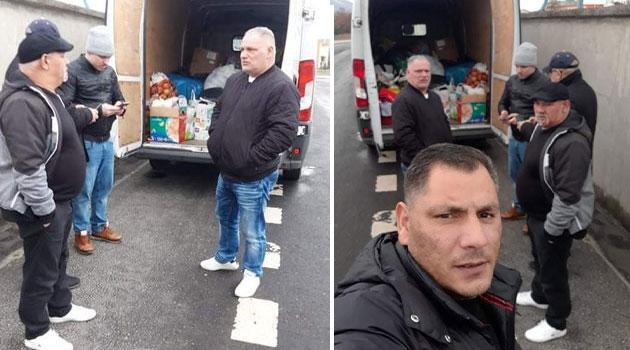Czech accommodation facilities discriminatorily, groundlessly expel Romani refugees from Ukraine

Unlike ethnic Ukrainians, some Romani refugees from Ukraine are facing bias and discrimination during their flight from Russian-occupied Ukraine, and not just at border crossings, but also inside the countries providing accommodation and other support to such refugees – such practices were described a few days ago to Romea.cz by a volunteer from the “Czechs Are Helping” initiative, Jaroslav Miko, who is coordinating the transport of mostly Romani refugees from Ukraine to the Czech Republic. Antonie Rašilovová, a student in the Department of Dramatic Theatre at the Academy of Performing Arts in Prague, Czech Republic, had a similar experience soon after joining the “Students for Ukraine” initiative following the outbreak of the Russian-led war against the democratic, sovereign country of Ukraine.
We wanted to bring in refugees from the war – they just happened to be Romani
Rašilovová brought two families of Romani refugees from Ukraine into the Czech Republic together with her friends who were volunteering. “We drove two Romani women and their four children by car, the youngest girls are only three years old,” she told the Romea.cz news server about this Romani refugee family from Uzhhorod, Ukraine, which is not far from the border with Slovakia.
“They walked across the pedestrian border crossing carrying just a Bible, otherwise they had nothing at all with them,” Rašilovová said. “We had gone to the border with the idea of bringing war refugees into the Czech Republic and helping them here.”
“We didn’t think at all about whether they would be ethnic Romani or ethnic Ukrainian, it basically was random,” the volunteer told the Romea.cz server. Upon their arrival in the Czech Republic, the women and their children were taken to a facility helping refugees in the Central Bohemian Region.
Romani refugee women with children from Ukraine unjustifiably expelled from two accommodation facilities
According to Rašilovová, at the time there was no indication that the refugees would have to move out the next day or that they would not be provided with an explanation of the necessary legislation related to refugees. “However, the next day [the facility] called us to take the family away, saying it wouldn’t ‘do any good’ for them to stay there,” Rašilovová described her experience.
“We transferred the family to another facility that same day where they also were offering help to refugees from Ukraine and the situation repeated itself. We had believed the family would stay there longer, that it would work, because there was an effort underway there to provide long-term aid to such refugees,” the student volunteer described.
“However, again [the facility] called us to take the family elsewhere,” Rašilovová said. After there were problems in communication between the Romani refugees from Ukraine and the center in the Central Bohemian Region, the non-profit organization Romodrom managed to provide them with accommodation.
Like the other Romani-run non-profit organizations affiliated with the umbrella organization RomanoNet, Romodrom has decided to respond to the current situation by expanding its services to help refugee Ukrainians, including Romani Ukrainian refugees who are facing discrimination during the enormous wave of efforts and solidarity being shown to non-Romani refugees by Czech society. “From the media coverage we have all noticed that people are offering accommodation to refugees from Ukraine, but if the refugees are Romani, the volunteers will change their minds or say they are waiting for another family,” Rašilovová is convinced.
“The argument is they do not want to accommodate a Romani family for some reason,” the student said. “None of us were prepared for this situation.”
“Some volunteers imagine they will accommodate a refugee from Ukraine, and when their expectations are not fulfilled, for example, exactly because of the ethnicity of the refugee, then they end up in a situation where they do not know how to behave,” Rašilovová told Romea.cz. “Then [the volunteers’] help becomes limited, or involves some conditions.”
From her own experience, the student recommends that people who are just getting involved in volunteering first contact a local non-profit organization that would help them communicate and explain how to help Romani people from Ukraine fleeing the war. Most of the children and women refugees who are Romani from Ukraine are ending up at a humanitarian registration center in the Frýdek-Místek district in the village of Vyšní Lhoty, where they are given hot meals and can stay for one night.
These refugees then travel to the Bělá-Jezová foreign national detention facility near Mladá Boleslav. Some families who are Romani refugees from Ukraine are also staying at the center for foreign nationals in Zastávka near Brno.
In the 10 days since the outbreak of fighting in Ukraine, more than 1.5 million people have fled to neighboring countries. Filippo Grandi, the UN High Commissioner for Refugees, announced that number today on Twitter.
According to Grandi, this is the fastest-growing refugee crisis in Europe since the end of World War II. Last Thursday, UNHCR announced one million people had crossed the border fleeing Russian troops.
